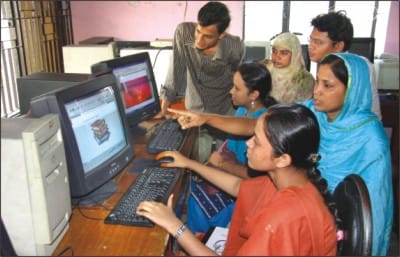Breathing life into ICT task force

IT leaders say the government must translate 'Digital Bangladesh', which is still a slogan on paper, into reality. Photo: Amran Hossain
The AL-led government in its first national budget has made it clear that it means business when it comes to 'Digital Bangladesh' the slogan from its election manifesto that defines the vision it has laid out for the nation going forward to the year 2021.
In a historic first, the budget speech has been dominated by ICT-centric vision in line with the alliance's commitment to give shape to 'Digital Bangladesh'. Fortunately for the alliance, the blueprint for 'Digital Bangladesh' was already in hand in the form of the revised ICT Policy that was prepared in consultation with all primary ICT stakeholders in mid-2008.
The new government was quick to recognise that and promptly approved the revised policy as the 'ICT Policy 2009' earlier this year.
The freshly minted ICT Policy 2009 replaces the earlier version adopted in 2002 and provides a coherent framework in the form of a policy pyramid to pursue the nation's ICT goals now and in the foreseeable future.
The ICT Policy 2009 drills down from a singular national vision of enhancing social equity through use of ICT to 10 broad objectives, 56 strategic themes and 306 action plans for a comprehensive sweep of all aspects of national life.
In order to materialise the vision of 'Digital Bangladesh' we now need to start implementing the action plans of the ICT Policy in a methodical manner.
To begin with, we must recalibrate the priorities of the action plans for this year in light of the present circumstances and overall government policy imperatives; then we must set the milestones to be achieved within this fiscal year. Besides, we should work out the financial expenditure for the high priority programmes; assess the return on investment (RoI) for the programmes (to make sure we get the maximum value for the money and also to avoid cosmetic IT programmes); and finally prepare benchmarks against which the success of the programmes will be determined at their completion.
The ICT Policy itself mandates reviewing the action plans each year, strategic themes every three years and the whole policy itself every six years.
The government needs to institutionalise these review mechanisms for pro-active management of the policy and its objectives. There has been a lot of debate on which body should assume that responsibility.
One school of thought favours the ICT Task Force headed by the prime minister to own and champion the ICT Policy from the centre..
The argument in favour of this is that rapid ICT development will require quick decisions and prompt coordination between various ministries, which can only happen with the direct intervention from the country's chief executive. However, detractors argue that the head of the government has to oversee everything and putting such operational matters under the direct supervision of the highest office in the government will only delay things. This latter group favours strengthening the line ministry for ICT (Ministry of Science & ICT to be exact) and the respective agencies under the ministry such as the Bangladesh Computer Council so that they can implement the ICT Policy according to the defined timeframe, assess the effectiveness of the programmes and reset the priorities and targets based on long-term vision and the experience of past programmes. The ICT Policy 2009 incidentally keeps both options open.
This author is of the opinion that the best way forward is somewhere in between. It would be a good idea to have the eyes and the ears of the prime minister on ICT priorities. At the same time the Science & ICT Ministry would need to deliver results on ICT developments by giving control of ICT management to ICT professionals.
The bridge between the two can be the executive chairman of the ICT Task Force. The principal secretary of the Prime Minister's Office serves in that position in an ex-officio capacity.
Since the principal secretary happens to assist the Prime Minister on all government-related business, he can easily coordinate the work of various government agencies in order to ensure execution of the ICT Task Force agenda.
However, the ICT Task Force executive chairman would have to be highly pro-active in such matters and would need to engage relevant members of the ICT Task Force executive committee for proper disposal of the ICT-related technical issues that would crop up from time to time.
The ICT Task Force, since it was constituted in the year 2000, has sat a grand total of five times in nine years; its executive committee fared a little better. However, if 'Digital Bangladesh' has to have any chance of morphing itself from being a slogan on paper to a vision realised, the ICT Task Force would need a much better track record than its past.

 For all latest news, follow The Daily Star's Google News channel.
For all latest news, follow The Daily Star's Google News channel. 



Comments